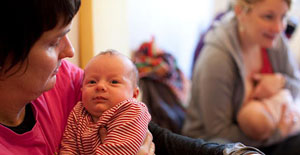Community Karitane
Tasks & duties

Community Karitane may do some or all of the following:
- provide support for and assess the health of families, especially the caregiver and child
- measure and weigh babies, and monitor their development
- provide education and information on health and development issues such as sleeping, nutrition and immunisation
- promote breastfeeding
- prepare health and parenting education programmes
- educate community groups about family health issues
- facilitate parent groups and karitane clinics
- monitor and recognise the signs of child abuse and domestic violence, and refer the child or caregiver to other professionals if necessary
- liaise between clients and community agencies such as Work and Income and Housing New Zealand
- gather and provide information for families about services available in the community
- transport clients to other health professionals
- work with Plunket volunteers to provide services
- keep accurate records and documentation about client visits
Skills & knowledge

Community Karitane need to have:
- an understanding of issues relating to child and family health and welfare, including the tamariki ora - well child service
- an understanding of different cultures
- an understanding of health needs in the community, particularly Maori health needs
- the ability to establish contacts and networks within communities
- childcare skills
- good communication and listening skills
- observational skills
- problem-solving skills
- organisational and time management skills
Entry requirements
To become a Community Karitane you need to have a current driver's licence. While there are no specific educational requirements, most employers prefer you to have an early childhood qualification and you must train on the job and complete a National Certificate in Tamariki Ora - Well Child Services, Level 4, which requires at least two days a week working in a Plunket clinic.
Secondary education
At least three years of secondary education is needed to become a Community Karitane. The Tots and Toddlers course in the Life Skills programme offered at some secondary schools may also be useful.
Training on the job
Community Karitane attend organised study days to keep up to date with the latest advances in medicine and health. They may also continue professional development in areas such as health and child development.
Useful experience
Useful experience for Community Karitane includes experience in an area of health provision or community social services, parenting, or work as a nanny or early childhood teacher.
Related courses
Community Client Care
Nannying and Early Childhood Care
For more information, please refer to Career Services.
Document Actions
